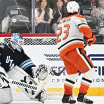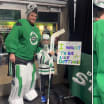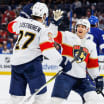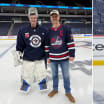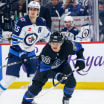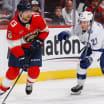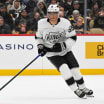MONTREAL --I had researched Bill Gadsby for days before we met north of Montreal a little more than three years ago, and I had literally dozens of questions mapped out for the Hall of Fame defenseman.
But every one of them moved down the list when I saw the cardboard Tim Hortons coffee cup sitting at the elbow of this nattily dressed gentleman who sat with perfect posture, carefully autographing a stack of photos and a small mountain of pucks at a private memorabilia signing.
Hall of Fame member Gadsby had storied past
Late great could tell tale, throw check with the best of them
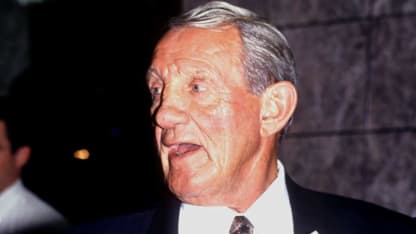
© B Bennett/Getty Images
I vividly remember this now, saddened by the news that Gadsby had died at age 88 on Thursday.
One of the great defensemen of his era or any other, another legend is gone.
"It scared the hell out of me, seeing the blood coming out of Tim's mouth and ear. I thought he was dead," Gadsby began, studying the cup when I mentioned Horton's name.
In his fourth season with Toronto, Horton was rushing the puck, head down, on March 12, 1955 when he swept into neutral ice at Maple Leaf Gardens. He never saw the express train wearing the New York Rangers jersey.
Gadsby's devastating, clean, open-ice hit of Horton broke the Maple Leaf's jaw and right leg, knocking him unconscious and ultimately setting his career back two seasons.
That bodycheck is commonly regarded as the most punishing of any ever dished out in pre-expansion hockey, largely viewed as every bit the equal of the catastrophic work decades later of New Jersey Devils defenseman Scott Stevens.
Maple Leafs owner Conn Smythe chased Gadsby down a Gardens corridor that night, Toronto's star rearguard having been taken to a hospital where for days he'd lie in traction and be fed intravenously.
"Thank God it wasn't a dirty check," Gadsby recalled, NHL senior referee Bill Chadwick having told him amid the chaos it was the hardest hit he'd ever witnessed.
Gadsby, a solid 195 pounds, felt almost nothing, saying this was typical of when he'd administered his heaviest checks.
"I remember this: [years later] when Toronto's Ronnie Ellis was coming off the ice, he said to me, 'Bill, if you ever see me coming down the ice the way Horton was, please give me a whistle?' Gadsby said.
"I never spoke to Tim about it. There were no hard feelings. He knew I wasn't trying to hurt him."
From 1946-66, the native of Calgary, Alberta, played 1,248 NHL games for the Chicago Blackhawks, New York Rangers and finally the Detroit Red Wings, another 67 in the Stanley Cup Playoffs.
Of the great many NHL legends I've had the pleasure to profile, none was more fascinating than Gadsby. The more I dug into my research, the more I was stunned by his life story that you couldn't invent.
In 1939, as a 12-year-old, Gadsby was a lifeboat survivor of a wartime Nazi submarine's torpedo sinking of the British ocean liner S.S. Athenia, bound for Montreal from Glasgow. Of 1,418 on board, 117 perished at sea about 400 kilometers northwest of the coast of Ireland.
He successfully battled polio while playing in the NHL; once there, he would be carved to ribbons, having an unofficial Original Six record of roughly 650 stitches sewn into his face.
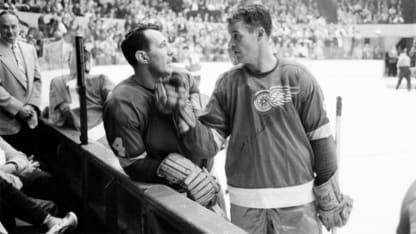
Gadsby recalled with a laugh that some nights, his wife, Edna, would remove the sutures in their kitchen with less than sterile junk-drawer scissors.
He laughed that day about the $100 insurance policy he once took out that paid him $5 per stitch. He made a good profit on that, the company quickly abandoning the money-losing policy.
Gadsby's durability was a thing of legend, his nose broken 11 times, the best he could figure. His motto, as related in his 2003 autobiography The Grateful Gadsby: "If I have a pulse, I believe I should play."
He once had the butt-end of a stick go up a nostril and nearly take his beak clean off.
"No freezing, they just stitched me up," he said, shrugging. "But that one hurt."
There were the ribs he had broken by a crosscheck one playoff series, waking in the hospital to find six needles protruding from his torso. The anesthetic, he said, wore off in June or July.
Chicago's Bobby Hull once knocked him out cold with a slap shot to his heart. He didn't miss a shift.
As we spoke that day, Gadsby chuckled about the story that the first of four daughters born to he and Edna once unexpectedly was babysat in a Chicago tavern by small-time hoodlum Matty Capone. The sitter's brother, Al, was a gangster of considerably more repute.
Gadsby had stories about every formidable opponent he faced over two decades, signing pucks and photos while spinning a special yarn about Chicago's Stan Mikita.
"He had a lot of guys against him - he'd spear you in the back of the leg and the groin and the chest," he said of the early-days Mikita. "But he cleaned up his act and it's a good thing. I hit Stan harder than anybody. I laid him out a couple nights and I told him, 'One of these days, I'm going to hit you so hard you're not going to get up.'"
But Mikita just kept coming back for more, often leading with his lip. Gadsby sent the Blackhawks star literally crawling back to the bench one playoff series, only to hear him hollering down a Detroit Olympia hallway postgame, "If you want tickets for the next round, Bill, call me!"
Gadsby never won the Stanley Cup in his 20 NHL seasons, getting closest with a seven-game 1964 series loss to Horton's Maple Leafs in the Stanley Cup Final. Two years later, Detroit opened the Final against Montreal with two wins on Forum ice then lost four straight, the clincher coming on Henri Richard's disputed winner in overtime.
Gadsby maintained Richard swept the puck past goaltender Roger Crozier with his arm as he slid toward the net, but any time he had asked the Pocket Rocket about it in the decades that followed, he said with a tight grin, "Henri smiles, mumbles something in French, then walks away. He knows …."
Gadsby was a hugely popular figure in Detroit until the very end, having coached the Red Wings in 1968-69. He cherished his bond with former Detroit teammate and NHL icon Gordie Howe, and until a few years ago attended a good number of games in the Legends suite at Joe Louis Arena.
As he signed his final puck that Saturday morning, Gadsby asked that his good wishes be conveyed to Jean Béliveau, his dear Canadiens rival who was in fragile health.
"A class guy and a hell of a hockey player," he said, punctuating the puck with the No. 4 both he and Béliveau wore to the Hockey Hall of Fame.
"It's been a good life. I had to scratch and claw for everything I got but, you know, I'd do it all over again. In a minute."
